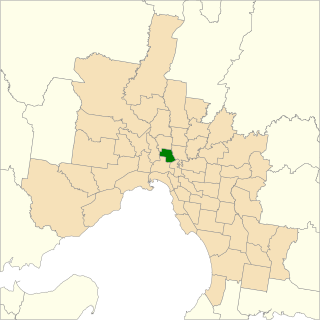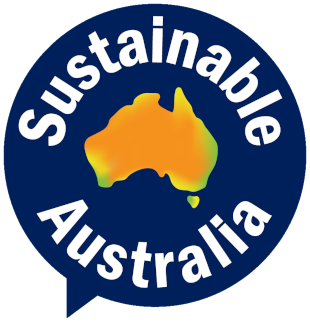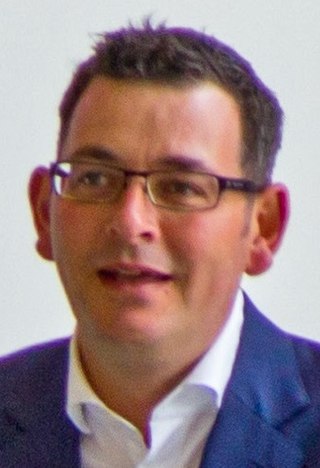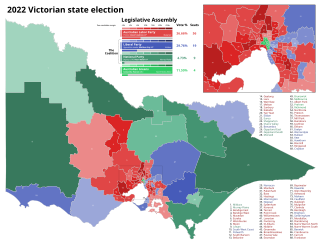Related Research Articles
Electoral systems of the Australian states and territories are broadly similar to the electoral system used in federal elections in Australia.

The Shooters, Fishers and Farmers Party (SFF) is a conservative Australian political party. It primarily advocates for increased funding and services for rural and regional Australia, protecting the right to farm, enhancing commercial and recreational fishing, tougher sentencing for illegal firearm trade and usage, and relaxing gun control for law abiding citizens.
A group voting ticket (GVT) is a shortcut for voters in a preferential voting system, where a voter can indicate support for a list of candidates instead of marking preferences for individual candidates. For multi-member electoral divisions with single transferable voting, a group or party registers a GVT before an election with the electoral commission. When a voter selects a group or party above the line on a ballot paper, their vote is distributed according to the registered GVT for that group.

The Victorian Greens, officially known as the Australian Greens Victoria, is the Victorian state member party of the Australian Greens, a green political party in Australia.

The electoral district of Brunswick is an electorate of the Victorian Legislative Assembly. It covers an area of 14 square kilometres (5.4 sq mi) in inner northern Melbourne, and includes the suburbs of Brunswick, Brunswick East, Carlton North, Fitzroy North, Princes Hill and parts of Brunswick West. It lies within the Northern Metropolitan Region of the upper house, the Legislative Council.
Donna-Lee Petrovich was an Australian politician. She was a Liberal Party member of the Victorian Legislative Council from 2006 to 2013, representing Northern Victoria Region. She resigned with a year remaining of her second term in order to contest the 2013 federal election in the seat of McEwen, but was defeated by Labor incumbent Rob Mitchell.

The Sustainable Australia Party is an Australian political party that was formed in 2010.

The 2014 Victorian state election, held on Saturday, 29 November 2014, was for the 58th Parliament of Victoria. All 88 seats in the Victorian Legislative Assembly and 40 seats in the Victorian Legislative Council were up for election. The incumbent centre-right Coalition minority government, led by Liberal Party leader and Premier Denis Napthine and National Party leader and Deputy Premier Peter Ryan, was defeated by the centre-left Labor Party opposition, led by Daniel Andrews. The Greens won two lower house seats, their first Legislative Assembly seats in a Victorian state election, whilst increasing their share of upper house seats. The new Andrews Ministry was sworn in on 4 December 2014.

The United Australia Party (UAP), formerly known as Clive Palmer's United Australia Party and the Palmer United Party (PUP), is an Australian political party formed by mining magnate Clive Palmer in April 2013. The party was deregistered by the Australian Electoral Commission in 2017, revived and re-registered in 2018, and voluntarily deregistered in 2022. The party fielded candidates in all 150 House of Representatives seats at the 2013 federal election. Palmer, the party's leader, was elected to the Division of Fairfax and it reached a peak of three senators following the rerun of the Western Australian senate election in 2014. When the party was revived under its original name in 2018, it was represented by ex-One Nation senator Brian Burston in the federal parliament.
The Minor Party Alliance (MPA) is a collaborative undertaking of small Australian political parties, created by Glenn Druery's "Independent Liaison" business, which assists in organising preference meetings and negotiating preference flows between minor parties in Australia. The aim of the Alliance is the election of Alliance candidates to Australian upper houses based upon the accumulation of their primary votes and the registered "above-the-line" party preferences to reach an electoral quota. For the Australian Senate, the quota for a half-Senate election in each State is normally 14.3%. The MPA effectively aims to "game" the electoral system, an act it believes to be justified, based upon their perception that the Australian electoral system is unfair and heavily biased against minor parties.
This is a list of candidates for the 2014 Victorian state election. The election was held on 29 November 2014.
Voice for the West was a minor political party in Australia. It was registered as a political party by the Victorian Electoral Commission in 2014 and ran candidates representing western Melbourne electorates in the 2014 Victorian state election.

Vote 1 Local Jobs was a minor political party in the state of Victoria, Australia. It was registered as a political party by the Victorian Electoral Commission on 3 November 2014, in time for the 2014 state election.
Daniel James Young is an Australian politician. He was a Shooters, Fishers and Farmers Party member of the Victorian Legislative Council, representing the Northern Victoria Region from 2014 to 2018.

The 2018 Victorian state election was held on Saturday, 24 November 2018 to elect the 59th Parliament of Victoria. All 88 seats in the Legislative Assembly and all 40 seats in the Legislative Council were up for election. The first-term incumbent Labor government, led by Premier Daniel Andrews, won a second four-year term, defeating the Liberal/National Coalition opposition, led by Opposition Leader Matthew Guy in a landslide victory. Minor party the Greens led by Samantha Ratnam also contested the election.
The Australian Sex Party was an Australian political party founded in 2009 in response to concerns over the purported increasing influence of religion in Australian politics. The party was born out of an adult-industry lobby group, the Eros Association. Its leader, Fiona Patten, was formerly the association's CEO.
Clifford Hayes is a former Australian politician. He was a Sustainable Australia member of the Victorian Legislative Council between 2018 and 2022, representing Southern Metropolitan Region. He was not re-elected at the 2022 state election.

The 2022 Victorian state election was held on Saturday, 26 November 2022 to elect the 60th Parliament of Victoria. All 88 seats in the Legislative Assembly and all 40 seats in the Legislative Council were up for election at the time the writs were issued, however the election in the district of Narracan was deferred due to the death of a candidate.

The Australian Federation Party (AFP), also known as AusFeds and formerly known as the Country Alliance and the Australian Country Party, is an Australian political party. Founded in 2004 by four rural Victorians, the party lodged its initial registration with the Victorian Electoral Commission on 15 August 2005.
Microparty, micro-party, or micro party is a term, sometimes pejorative, for a small political party that doesn't attract enough votes to be elected to a legislature in its own right. The term is most commonly used in Australia where the combination of single transferable vote and group voting tickets enabled microparties to direct preferences to each other, so that one of them could well be elected even when each party individually attracted very few primary votes.
References
- ↑ "Currently registered parties". Victorian Electoral Commission . Retrieved 29 October 2018.
- ↑ Benalla Ensign (7 July 2018). "Aiming to offer an alternative" . Retrieved 2 November 2018.
- ↑ "Hudson | for Northern Victoria". Archived from the original on 15 October 2018. Retrieved 23 October 2018.
- ↑ "South Eastern Metropolitan Region". Victoria Votes. Australian Broadcasting Corporation . Retrieved 2 November 2018.
- ↑ "Western Metropolitan Region". Victoria Votes. Australian Broadcasting Corporation . Retrieved 2 November 2018.
- ↑ Green, Antony [@AntonyGreenABC] (8 November 2018). "You have to love how a party called "Hudson for Northern Victoria" runs in every region. Micro-party alliance preference harvesting anyone? Though voters may not understand what the party name "Hudson for NV" on the ballot paper means. Not NV-us" (Tweet). Retrieved 17 November 2018– via Twitter.
- ↑ Tatura man Josh Hudson off to form own party [ permanent dead link ]